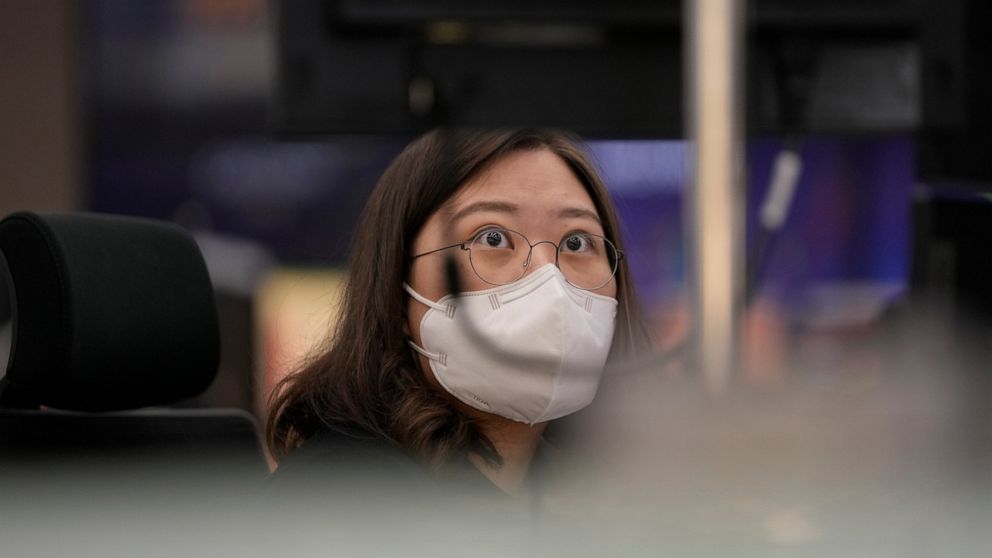World shares mostly higher after wobbly day on Wall Street
Shares in Europe and Asia have logged moderate gains after an easing of the latest bout of turbulence on Wall Street
Global shares were mostly higher Thursday as the latest bout of turbulence on Wall Street abated.
Benchmarks rose in all major markets and U.S. futures jumped. Oil prices fell back.
European countries united in condemning a decision by Russia to cut natural gas shipments to Poland and Bulgaria as a failed attempt to divide the West in its support for Ukraine.
Russia’s escalation in the economic standoff of sanctions and countersanctions could force targeted countries to ration gas, dealing a fresh blow to economies strapped by rising prices.
Natural gas prices surged as much as 24% Wednesday in Europe and the euro weakened after Russia said it would cut off supplies to Poland and Bulgaria. Natural gas and oil prices already were rising as the pandemic eased and demand increased, but the Russian invasion of Ukraine has added to price increases.
Stock markets appeared to shrug off those concerns Thursday.
Germany’s DAX jumped 1.7% to 14,024.01 while the CAC 40 in Paris added 1.7% to 6,555.55. Britain’s FTSE surged 0.8% to 7,484.85. The future for the S&P 500 climbed 1.5% while the Dow future was up 0.9%.
Oil prices fell back, with U.S. benchmark crude oil losing 46 cents to $101.56 per barrel in electronic trading on the New York Mercantile Exchange. It picked up 32 cents on Wednesday to $102.02 per barrel.
Brent crude, the standard for pricing international oil, shed 60 cents to $104.35 per barrel.
Shares advanced in Asia after the Bank of Japan kept its near-zero interest rate stance unchanged.
Tokyo’s Nikkei 225 rose 1.8% to 26,847.90 on stronger-than-expected retail sales data. However, the Japanese central bank downgraded its outlook for the world’s third-largest economy to take into account rising energy costs and uncertainties raised by Russia’s invasion of Ukraine.
The dollar rose to 130.60 Japanese yen from 128.43 yen late Wednesday. It started the year at about 115 yen and has risen much faster than earlier estimates on expectations the U.S. Federal Reserve will aggressively raise interest rates to counter surging inflation. That has prompted investors to sell yen to seek higher returns in dollar-denominated assets.
The euro slipped to $1.0545 from $1.0560.
Some Japanese officials have expressed concern over the yen’s weakness at a time when costs for imported oil, gas and other commodities are soaring. But the Bank of Japan has indicated it intends to keep lending conditions ultra-lax to help support the sluggish economy.
In its summary of the outlook for the economy, the BOJ said the chief risks were coronavirus outbreaks and “extremely high uncertainties over developments in the situation surrounding Ukraine and the associated developments in commodity prices, global financial and capital markets, and overseas economies.”
Chinese benchmarks were higher amid a flurry of official commentary highlighting the ruling Communist Party’s efforts to counter the impact of pandemic shutdowns in many cities.
The Shanghai Composite index gained 0.6% to 2,975.48 and Hong Kong’s Hang Seng jumped 1.5% to 20,238.22.
Strict COVID-19 lockdown measures in China have added to concerns about slowing growth, disrupting the flow of industrial goods and other business activity in Shanghai, home of the world’s busiest port, and other industrial cities including Changchun and Jilin in northeast China.
Beijing has been conducting mass testing this week as it decides on what degree of controls to impose in the capital.
Elsewhere, the Kospi in Seoul added 1.1% to 2,667.49. Australia’s S&P/ASX 200 surged 1.3% to 7,356.90.
Wall Street ended Wednesday with a lackluster finish as traders braced for more earnings reports from major U.S. companies. Twitter, Apple and Amazon will report their results on Thursday.
The S&P 500 saw most of a midday rally evaporate and wound up with a gain of just 0.2%. The Dow Jones Industrial Average also added 0.2% while the Nasdaq was barely changed. The Russell 2000 fell 0.3%.
![]()


